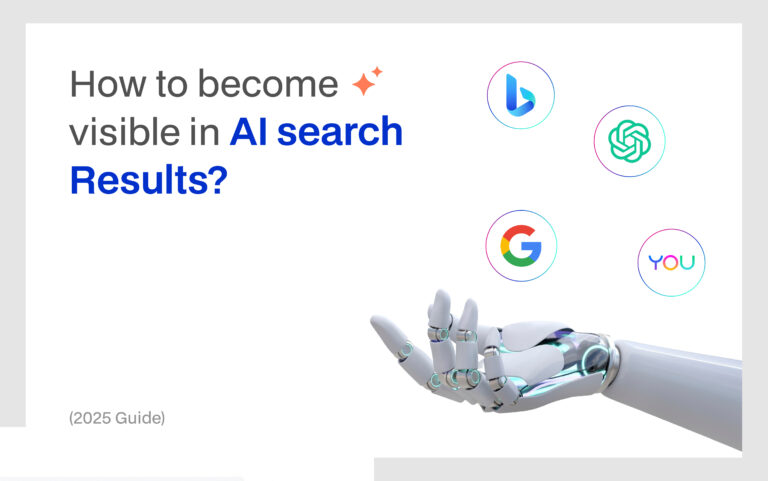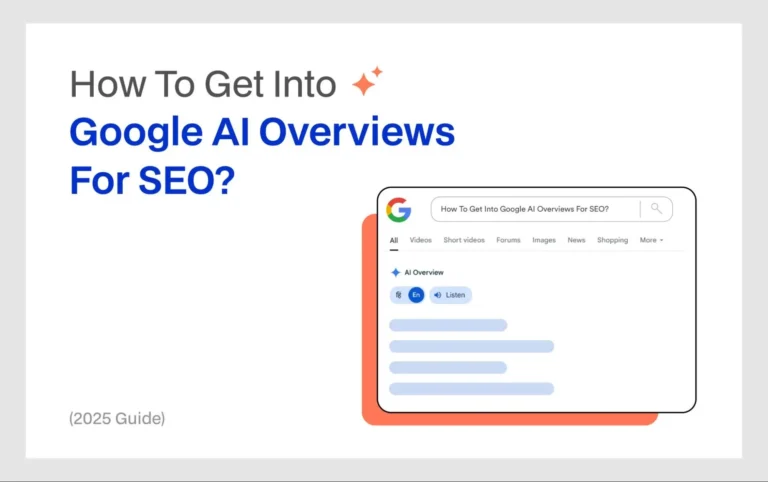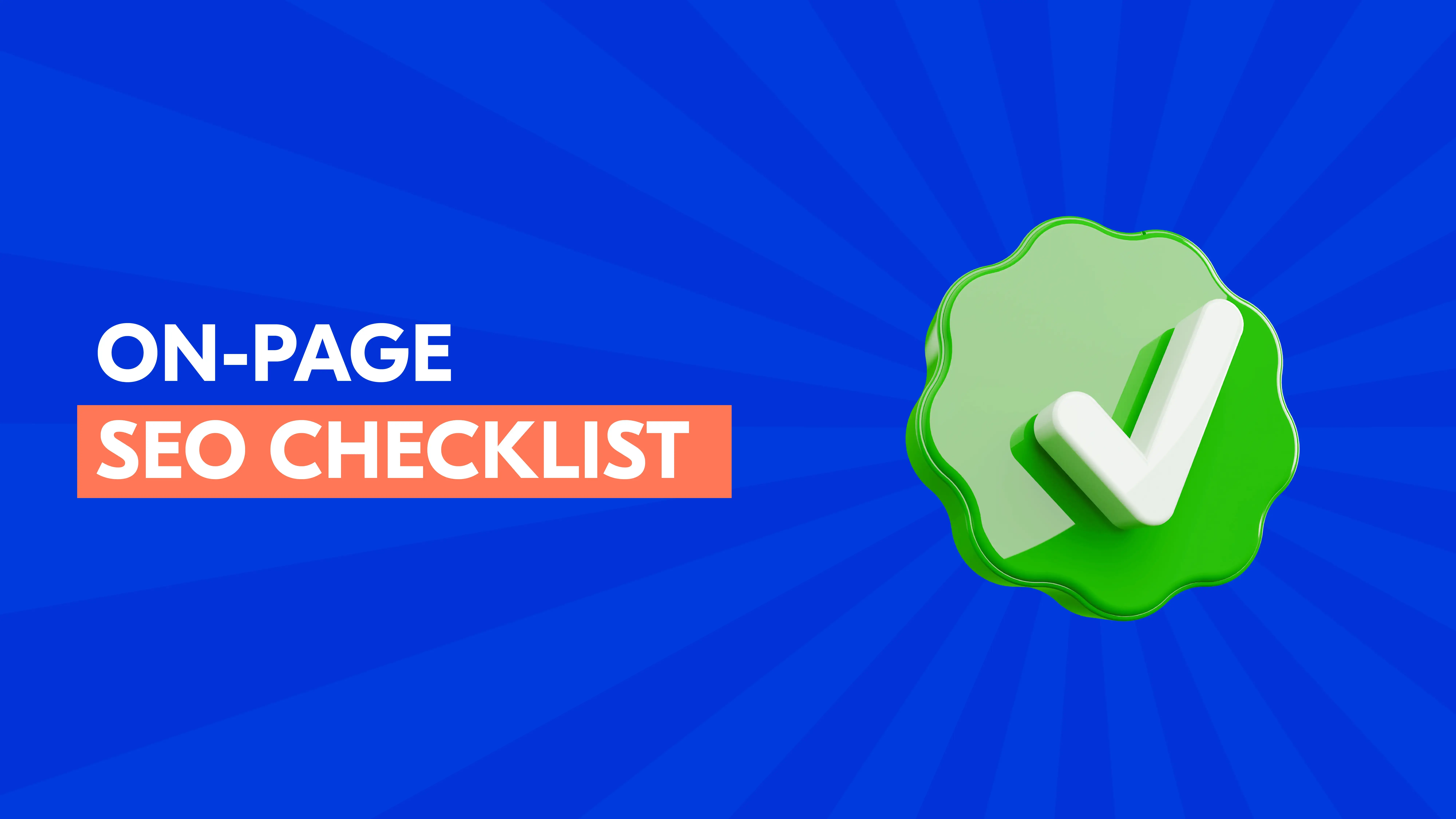Keyword research used to be easy. Just find a popular search term, add it to your website, and hope Google puts you on page one.
But now, things have changed.
People aren’t just typing short keywords anymore. They’re asking full questions like:
- Which plumber is open late near me?
- Can I write this off as a small business owner?
- Best curly hair salon in East Austin?
And tools like Google AI Overviews, ChatGPT, and voice assistants are giving answers, often without showing a list of websites.
So, if your business isn’t showing up in those answers, you’re missing out.
This is exactly why I’ve compiled my AI-ready keyword research tips for small businesses like yours. Here, I’ll walk you through how to find the right keywords that work for both traditional Google search and AI tools.
You’ll learn:
- How to find questions your customers are really asking
- What kind of keywords help you show up in AI answers
- Simple ways to use those keywords on your website
No fluff or tech talk, just clear tips that help real businesses get found online.
Let’s dive in.
Key Takeaways
- Old keyword tricks don’t work like they used to.
- AI tools now care more about clear answers than repeated keywords.
- People search by asking full questions, so write like they talk.
- Small businesses can beat big ones by being more helpful and local.
- Use tools like ChatGPT, Google Keyword Planner, and AnswerThePublic to find real questions.
- Focus on specific phrases like “emergency plumber in East Austin” instead of broad terms.
- Organize your content with clear headings and FAQs to help AI understand it.
- Refresh your keyword strategy every few months to keep up with changes.
What is keyword research?
Keyword research is a way to figure out what your potential customers are typing into Google (or even asking AI tools).
This is not just for big companies or marketing experts.
For small businesses like yours, it’s a smart way to connect with people who are already looking for what you offer.
For example, let’s say your potential customer searches for:
- Family dentist in South Philly
Or
- Best vegan bakery near me
Now, if your website includes those words and answers their question, you’ve got a better shot at showing up in results.
So your real goal is this: Understand how people ask questions and create simple and helpful content that answers them.
You see, keyword research is not about chasing the most popular keywords. You simply want to show up for the right people, in the right place, at the right time, be it on Google, ChatGPT, or other search tools.
Do it right and this will help your business get seen, build trust, and even beat bigger brands.
Has keyword research changed?
Yes, it has.
Before, it was all about stuffing the exact keyword into your page and trying to rank on Google.
But now, people search using full questions, and the new AI-powered Google and tools like ChatGPT give answers instantly.
So, instead of chasing high-volume words, your goal is to answer real questions in a clear and helpful way.
Here’s what has changed and how you can adapt:
Here’s what has changed and how you can adapt:
| Old SEO | New AI Search |
|---|---|
| Use exact keywords repeatedly | Use natural full-sentence questions |
| Ranking = traffic | Helpful answer = visibility |
| Focus on Google search | Focus on AI, voice, and social search too |
| Static keyword lists | Flexible real-world questions |
| Stuffed content | Clear, helpful, easy-to-read content |
What are some keyword research tips small businesses can follow?

As a small business, your content needs to match how your customers talk, what questions they ask, and how AI tools find answers.
The good news?
As a small business, you don’t need a big budget. You just need to be more helpful and clear than the big guys.
Here are some simple keyword tips to help your business get found by your potential customers.
1. Start with what problems your customers are trying to solve (not just what you sell)
When people search online, they’re usually not typing in your product name. They’re asking for help.
That’s why it’s better to focus on the problems your customers are having and not just the services you offer.
So, instead of using the keyword “teeth whitening service,” think about what someone might actually ask.
For instance:
“How can I whiten my teeth quickly before my wedding?”
That’s the kind of question people ask and the kind of thing tools like ChatGPT and Google’s AI love to answer.
To find these types of problem-based questions, try this:
- Pay attention to what customers ask you on calls, emails, or in person
- Start typing something into Google and see what it suggests
- Check out Reddit, Facebook groups, or Quora and see what people are asking
- Look at your competitors’ FAQs and customer reviews for inspiration
This will help you speak your customer’s language, not marketing lingo, and show up in the places they’re actually looking for help.
2. Pay attention to how people actually ask questions
These days, people don’t just type a few words into Google. They talk to their phones, smart speakers, or even tools like ChatGPT.
This means their questions sound more like real conversations.
Think about it:
Instead of typing “HVAC repair,” someone might ask, “Who can fix my AC fast in Dallas?”
That’s exactly what today’s search tools are built to understand.
So when you’re creating content (like website pages or blog posts), try to include full, natural questions.
Here are a few things that make great blog titles, section headers, and FAQs on your website:
- Why is my furnace making a weird noise?
- Is there a same-day plumber near me?
- How much does teeth whitening cost in Brooklyn?
Need ideas for what people are asking? Try:
- Typing your service into Google and seeing what it suggests
- Clicking on “People Also Ask” in Google results
- Using free tools like AnswerThePublic or AlsoAsked
- Asking ChatGPT: “What are 20 questions someone might ask before hiring a [your service] in [your city]?”
Your goal is simple: Show up when people ask real questions, in their own words.
Here’s how people search these days:
| Type of Search | What People Might Ask | What You Should Do |
|---|---|---|
| Voice Search | What’s the best Thai food near me that’s open now? | Use natural-sounding phrases and add words like “near me” |
| Ready to Buy | Emergency HVAC repair in North Dallas with good reviews | Use detailed phrases that show urgency and location |
| Looking for Info | How much does Invisalign cost in Brooklyn? | Create helpful content that explains things clearly and locally |
| Local + Urgent Need | Same-day passport photo service in downtown LA | Include your city, service, and words like “same-day” |
3. Let AI help you come up with more keyword ideas (and organize them)
Once you have a few good keyword ideas, you don’t have to figure everything out on your own. Let AI give you a hand.
You can use tools like ChatGPT to help you:
- Come up with more keywords people might use
- Group those keywords based on where someone is in the buying process
Here’s how that works:
Let’s say you run a plumbing business in Austin. You could ask ChatGPT: Give me a list of keyword ideas for a local plumbing business in Austin, some for people just researching, some for people comparing options, and some for people ready to book.
It’ll give you organized keyword ideas like:
- Just researching: Why is my water pressure low?
- Comparing options: Best affordable plumbers in Austin
- Ready to book: Same-day plumber near me open now
You can use these ideas to plan:
- Blog posts
- Service pages
- FAQs
- Google Business Profile optimization and update
This saves you time and helps you show up for real questions people are asking.
Here is a simple keyword planning strategy using AI:
| Stage of Customer Journey | Example of What They Might Search | Best Type of Content to Create |
|---|---|---|
| Just Looking | Why is my furnace making noise? | Blog posts, FAQs that explain the problem |
| Comparing Options | Best HVAC companies near me with financing | Service pages, comparison guides |
| Ready to Buy | Schedule same-day AC repair in Austin | Booking pages, Google Business listing, contact info |
4. Use super specific keywords, especially for your local area
If you want your business to show up when people are searching on Google, Siri, or ChatGPT, details matter.
So, instead of using general words, try to be as specific as possible.
These extra-detailed keywords are called long-tail keywords and they’re your secret weapon, more so if you’re running a local business.
For example, instead of just saying:
- Vegan bakery
Try:
- Best vegan bakery open on Sunday in downtown Tulsa
Or instead of:
- Dog groomer
Try:
- Emergency dog groomer near East Austin with good reviews
Notice how these include helpful details like location, timing, and urgency?
That’s exactly the kind of stuff people type or say when they need something right now. And AI tools are built to pick up on those signals.
You can also try adding words like:
- Near me
- In [your neighborhood or city]
- Open now, emergency, same-day
- Top-rated, affordable, or trusted
These help you show up for the people who are ready to take action.
Here are some keyword examples that work well for local search:
| Type of Keyword | Example | Why It Works |
|---|---|---|
| Very Specific (Long-Tail) | Affordable Invisalign for teens in Queens NY | It’s clear, detailed, and shows someone is ready to buy |
| Local & Timely | Plumber open Sunday in East Atlanta | Shows urgency and exact location, perfect for local search |
| Voice Search Style | Where can I get a haircut near me now? | Sounds like how people talk to Alexa or Siri |
| Problem-Solving | How to remove pet odor from couch quickly | Answers a real-life problem. AI loves helpful content |
5. Check how popular and relevant your keywords are
It’s good to know how many people are searching for a keyword, but that’s not the only thing that matters anymore. AI cares more about whether your content really answers what people want.
Here’s what you can do:
- Use free tools like Google Keyword Planner or Ubersuggest to see how often people search for certain words.
- If you want more detail, tools like Semrush or Ahrefs can show how hard it is to rank for those words and spot trends.
- Ask ChatGPT something like: Which keyword would AI prefer: [Keyword A] or [Keyword B], and why?
This helps you pick keywords that make the most sense, not just the most popular ones.
6. See what keywords are already getting you noticed by AI
Want to know if Google AI, ChatGPT, or others are already talking about your business?
Here’s a simple way to check:
- Ask ChatGPT questions like:
Who’s the best [your service] in [your city]?
What do customers say about [your business]?
- Try typing your keywords into sites like Perplexity.ai and see if your business or your competitors show up.
- Search your business name on Google, Gemini, or Claude to see what they say about you.
Doing this helps you understand how AI sees your business. Then, you can create content that matches or improves that picture.
You might also want to read: How To Get Into Google AI Overviews?
Which tools can you use for AI-friendly keyword research?

You don’t need fancy, expensive software to find good keywords for your business. There are plenty of free or affordable tools that help you find the kind of questions and search terms your customers actually use.
These tools make it easier to create content that AI-powered search engines and voice assistants like.
Here’s a list of the best tools to get you started without spending too much:
1. SEMrush: Great for growing small businesses
SEMrush is a powerful tool used by many marketers. If you want to invest a little to get a lot, this is a top choice. It helps you:
- See how hard it is to rank for certain keywords
- Check what keywords your competitors are using
- Track your website’s rankings in different places
- Find ways to improve your site and content
If you want one tool that does it all and grows with your business, SEMrush is a solid pick.
2. Ahrefs: A favorite for detailed SEO work
Ahrefs is popular for good reason. It offers:
- A big database of backlinks to help you build links
- Keyword research with search volume and difficulty info
- Tools to see what keywords your competitors rank for that you don’t
- Insights on how websites get their traffic
Pro tip: Use Ahrefs to find question-based keywords, perfect for FAQ pages and blog posts.
3. Google Keyword Planner: Free and reliable
This tool comes free with a Google Ads account and is a classic choice for beginners. It lets you:
- See estimated search volume for keywords
- Target specific locations
- Explore different keyword matches
Pro tip: Don’t just look at search numbers, use AI tools like ChatGPT alongside Google Keyword Planner to understand what people really want.
4. Moz Keyword Explorer: Easy for beginners
Moz is great if you’re new to SEO. It gives you:
- Scores that show how hard keywords are to rank for
- Estimates of how many people click on search results
- Info on who’s ranking and what content works best
It’s perfect for creating content that AI and real people both like.
5. Ubersuggest and Mangools: Budget-friendly all-in-one tools
If you want a simple and affordable toolset, these are excellent. They offer:
- Difficulty scores for keywords
- Info on who ranks for what
- Local keyword filters for your neighborhood or city
Mangools’ KWFinder is especially easy to use and great for finding local keywords and long-tail phrases.
6. AlsoAsked and AnswerThePublic: See what questions people ask
These tools gather real questions people type into search engines.
- AlsoAsked groups related questions, helping you organize your content better
- AnswerThePublic shows visual maps of questions sorted by who, what, why, and how
Use these insights to create content that AI search results love to show.
7. ChatGPT and Gemini: To brainstorm questions
Want to know what questions your customers might ask?
Use AI!
You can try asking: What are 20 nAlsoAskedatural language questions someone might ask before hiring a [your business type] in [your city]?
This gives you lots of ideas for blog posts, FAQs, or videos. It’s like having a focus group ready anytime you want.
To sum it up
In the past, SEO was mainly about getting to the top of Google’s list of links. But things are changing fast. Now:
- Getting noticed by AI tools is how you get your business in front of people first
- It’s not just about stuffing keywords as you need to sound natural and helpful
- AI picks answers based on how clear, well-organized, and trustworthy your content is
So, write like you’re talking to your customers, but also keep in mind how AI reads your content.
When you do that, you don’t just appear in search results, you get picked by AI as the best choice.
Got questions or want help building a simple AI SEO plan for your business?
Reach out to us!
At Your Hustler Inc., we specialize in helping small businesses like yours get noticed by AI through clear, trustworthy content and smart strategies. We’ll help you grow your visibility and make your business shine on AI-powered platforms.
Frequently asked questions
How is AI keyword research different from regular SEO?
Old-school SEO was all about matching exact words and getting high rankings. Now, AI SEO focuses on natural, clear, and helpful content that AI can easily understand and use.
What’s the best free tool for finding keywords for small businesses?
You can try these:
- ChatGPT or Gemini for fresh ideas
- Google Keyword Planner to see how many people search certain words
- AlsoAsked to find real questions people are asking
- Google Search Console to check what’s already bringing visitors to your site
Should I still care about keyword difficulty?
Yes, but in a smarter way.
Go for easy-to-rank specific phrases that real people actually use and not just popular broad terms.
How can I tell if AI tools are using my content?
Ask AI questions like:
Who are the best [your service] providers in [your city]?
Check tools like ChatGPT, Perplexity, or Claude to see if your business shows up.
Also, you can use AI search visibility tools to track mentions.
Is ChatGPT replacing Google for keyword research?
Not at all!
ChatGPT is a helpful sidekick to Google. It helps you find natural ways people ask questions and keeps you on top of what’s trending.






